The Web3 and AI Newsletter 11

Hello, everyone, and warm welcome to all newly joined subscribers!
This is the Web3 + AI newsletter, where we explore the intersection of blockchain and artificial intelligence. A huge bunch of news awaits you, but first, allow me some housekeeping. My good friend Mark Yue and I have a special Lunar New Year gift for you: the Web3 + AI blog is now available in Chinese here! We are looking forward to welcoming all Mandarin-spreaking fans of blockchain and artificial intelligence into our community!
I am also happy to share that I have finally found a user-friendly solution for crypto payments in the face of Loop Crypto. As I've said before, my content is free and will remain so. However, in case you deem it worth supporting, I would greatly appreciate it if you opt for a paid subscription.
Thank you for being here! Let's dive in!
What's New in the Web3 + AI Startup World?
Octavia Partners with BeFi Labs, StoryFire
The Web3 + AI autonomous assistant Octavia will be integrated into the trading platform BeFi Labs to boost trade automation and knowledge sharing. BeFi Labs is an exchange focused on Bitcoin-based assets, namely BRC20 tokens (experimental fungible token standard on top of the Bitcoin blockchain) and Ordinals (digital assets inscribed as non-fungible tokens (NFTs) on the Bitcoin blockchain).
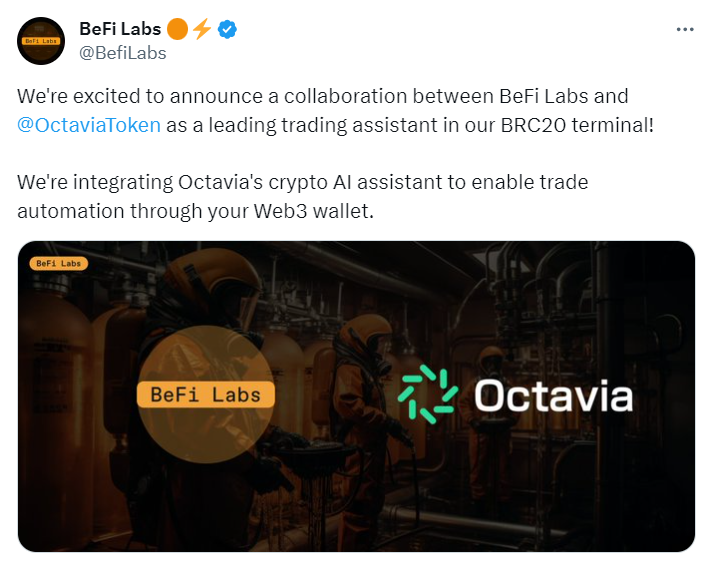
In addition, Octavia Labs has struck a strategic partnership with StoryFire - a platform converging social media (SocialFi), gaming (GameFi), and decentralized finance (DeFi). By combining a metaverse and a gaming hub with various token utilities, a social platform incentivizing content creation and collaboration, and a dedicated wallet, StoryFire has managed to build a large and highly engaged community. Through this alliance, it will implement Octavia’s advanced AI moderation tool to enhance the user experience even more, thus promoting Octavia to an audience of almost 2 million people.

Upshot Releases Decentralized AI Network Allora
Upshot, an AI + crypto infrastructure builder, has unveiled Allora - a decentralized and self-improving network of machine learning (ML) models. Allora helps ML creators monetize their work while also incentivizing them to evaluate and learn from other models on the network. Contributions to fine-tuning open-source ML models will also be rewarded with crypto, to ensure that the best models earn the most and gain network influence.
By combining research at the frontier of crowdsourcing mechanisms (peer prediction), federated learning, and zkML, Allora unlocks a vast new design space of applications at the intersection of crypto and AI.
Allora markets itself as a general-purpose AI network, that is blockchain- and sector-agnostic, i.e., there is no limit to the types of applications that can be built on top. The first solutions that are already being deployed are in the fields of AI-powered price prediction, vaults, and risk modeling.

EZKL Launches Lilith, A ZKP Generation System
EZKL is a pioneer in the emerging sector of ZKML (Zero-Knowledge Machine Learning) - a technology combining blockchain and artificial intelligence to certify the authenticity of AI models. ZKPs or Zero-Knowledge Proofs are a cryptography method used to prove a piece of information without revealing the information itself. In this particular use case, ZKPs are employed to guarantee that an ML model has produced certain outputs without having to expose the model.
Now, EZKL has released a beta version of Lilith - a high-performance backend system for zero-knowledge proof generation at scale. The team testifies that Lilith was built to overcome the common challenge of running more ambitious models on custom hardware.
That's why we've designed Lilith, software for integrating high-performance compute clusters, orchestrating concurrent jobs, and managing your artifacts.
I am preparing a comprehensive analysis of the fascinating ZKML space and applications. Stay tuned!
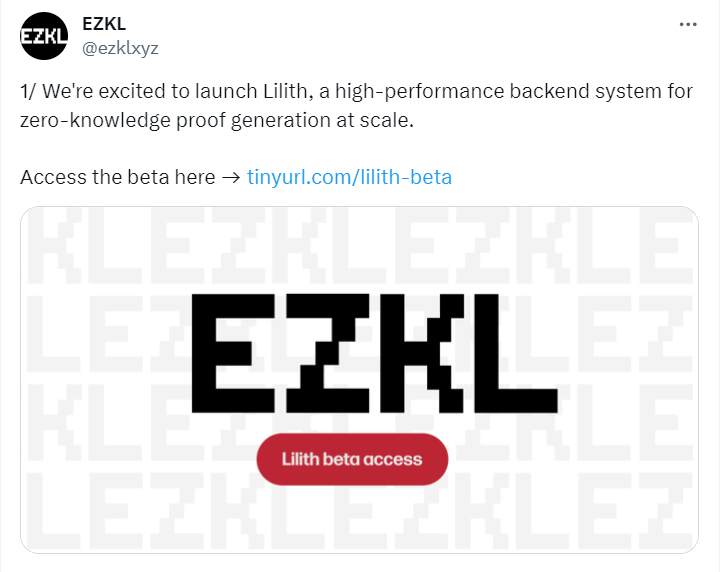
FewSats: First Bitcoin + AI Platform
Last year, Lightning Labs, the creator of the Bitcoin scaling solution Lightning Network, launched a set of developer tools to power its convergence with AI. Namely, these tools comprised the L402 protocol, a Lightning native authentication mechanism, and Langchain, a popular library to simplify working with AI agents.
This suite of tools allows AI agents to interact directly with Bitcoin and the Lightning Network. (...) Developers can create an AI "agent" with its own Bitcoin wallet, capable of transacting Bitcoin and interacting directly with Lightning Network Daemon (LND) nodes. L402 is the technical standard in this transaction payment interaction, achieving fast, scalable micro-payment API globally.
Now, the first platform built on L402 is already a reality, as FewSats just announced their alpha release.
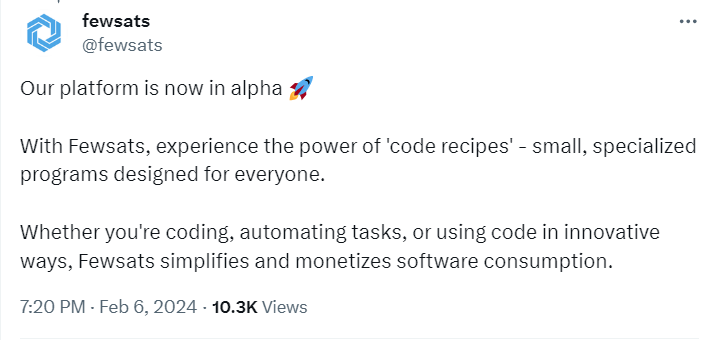
For now, FewSats tries to encourage and monetize software consumption
(...) it's a SaaS (Software as a Service) platform that allows users to pay small amounts via the Lightning Network to execute developers' code on a per-use basis.
However, it seems like they might have ambitions in the realm of AI as well.
OriginTrail Powers EU's BUILDCHAIN Project
Even though this is not a piece of news per se (this collaboration was launched over a year ago), I just found out about it and decided to share it with you. It is a showcase for the high-impact use cases that the synergy of blockchain and artificial intelligence can deliver.
BUILDCHAIN is a project funded by the European Union that aims at transforming Europe's building sector, or more particularly, the way “we design, construct, and maintain our buildings”. In practice, BUILDCHAIN leverages OriginTrail's decentralized knowledge graph technology to collect, verify, and manage various kinds of building-related data such as energy efficiency, circularity, and climate resilience. The data will be used to power modeling tools and optimizing functions to ultimately improve the safety, health, and comfort of building occupants.
The BUILDCHAIN project will design and develop its own Digital Building Logbook solution for the integration of building data and knowledge, and the inclusion of new applications and functionalities dealing with integrated information, efficiency, circularity and transparency to improve the building stock, facilitate informed decision-making and its validation.
BUILDCHAIN also aims to “create a new tokenized economy around Digital Building Logbooks (DBLs)”.
OriginTrail empowers the seamless traceability of data. It merges the creation of knowledge assets with a dedicated incentivization system to guarantee that only useful knowledge is mined. Its knowledge assets can be connected to different blockchains and even minted as NFTs. If you are interested in learning more about the protocol's inner workings, I recommend you listen to their demo at the December Gnosis AI call.

Noteworthy Podcasts, Articles, Events
Vitalik Buterin's Cautious Optimism on Crypto + AI
Ethereum's co-founder and main driving force Vitalik Buterin published a long-form blog post on the growing number of use cases in the intersection of blockchain and artificial intelligence. In it, he expresses his optimism that with both blockchains and AI becoming more powerful, certain synergistic applications are finally possible. At the same time, Buterin is quite cautious and warns against blindly trusting AI to execute some tasks.
Buterin lists 4 main use cases in the intersection of Web3 + AI and gives his evaluation of how viable and desirable each of them is:
- AI as a player in a game [highest viability], i.e., AI used in a protocol with human-controlled incentives. Here, Buterin highlights AI-powered prediction markets as an application that is to become ubiquitous in the coming years. Yet, he cautions against fully relying on such AIs since they still may be created by centralized actors, and thus be biased. What is more, if AI oracle is employed, it may turn out to be vulnerable to malicious attacks, and the consequences may be dire. To overcome this challenge, Buterin suggests an on-chain RLHF (Reinforcement Learning from Human Feedback) mechanism where AIs are rewarded or penalized with crypto based on human feedback.
- AI as an interface to the game [high potential, but with risks]. Buterin see AIs used as assistants or real-time tutors by various crypto applications as a positive development.
AI could give a much richer human-friendly explanation of what kind of dapp you are participating in, the consequences of more complicated operations that you are signing, whether or not a particular token is genuine.
These types of AIs can be quite impactful in preventing scams and misinformation. Still, adversarial machine learning is a serious concern that should be taken into account.
- AI as the rules of the game [tread very carefully]. Here Buterin talks about using AI as a judge and, generally, advises against it.
If an AI model that plays a key role in a mechanism is closed, you can't verify its inner workings, and so it's no better than a centralized application. If the AI model is open, then an attacker can download and simulate it locally, and design heavily optimized attacks to trick the model, which they can then replay on the live network.
He mentions ZKPs as a technology that could circumvent potentially dystopian scenarios but assumes that the computational overhead may be too high, since AI is already quite computationally heavy. Maybe the above-mentioned EZKL's solution Lilith may be of help here.
- AI as the objective of the game [longer-term but intriguing]. Buterin believes that, in time, we might be able to create AIs with utility beyond blockchains. However, blockchains and crypto should still be integrated either to prevent data leakages or to achieve a better incentive design - he celebrates the use of incentives to boost AI's improvements and refinement. He also maintains that blockchains can contribute to a more democratic governance of systematically-important AIs, remedy biases, or guarantee the existence of a kill switch.
In general, use cases where the underlying mechanism continues to be designed roughly as before, but the individual players become AIs, allowing the mechanism to effectively operate at a much more micro scale, are the most immediately promising and the easiest to get right.
Binance's AI + Crypto and DePIN Reports
One of the world's largest centralized crypto exchanges, Binance has released two consecutive research reports exploring Web3 + AI and showcasing the growing interest in the synergy of blockchain and artificial intelligence. The first, specifically dedicated to AI + Crypto, outlines the rising funding in AI-related crypto projects and the positive performance of AI-related tokens throughout the whole of 2023.

The second one concerns DePINs - the decentralized physical infrastructure networks I wrote about last week. The authors emphasize the sector's rising significance and confirm their forecast of DePINs proliferation over the coming years. However, they also alert that DePINs' long-term viability and success ultimately depend on them being able to solve real-world problems.

Hugging Face to Rival OpenAI's custom GPTs
The open-source AI lab and repository Hugging Face announced the launch of third-party customizable Hugging Chat Assistants. This is a strategic move to offer an open-source alternative to OpenAI's GPT store and its various ChatGPT versions. The Hugging Face chatbots come with the significant advantage of being free to use. Moreover, they can rely on a plethora of open Large Language Models (LLMs), whereas OpenAI's assistants depend on GPT only.
With the rising popularity of OpenAI and its products, I believe it is paramount to highlight that there are equally good or even better open-source options. In time, AI chatbots will become ubiquitous, and open-sourcing them is the only way to keep them reliable.
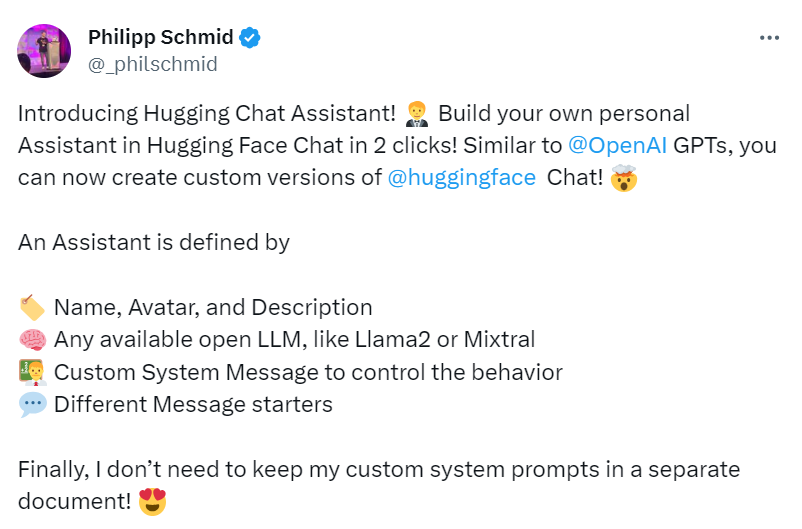
Disclaimer: None of this should or could be considered financial advice. You should not take my words for granted, rather, do your own research (DYOR) and share your thoughts to create a fruitful discussion.



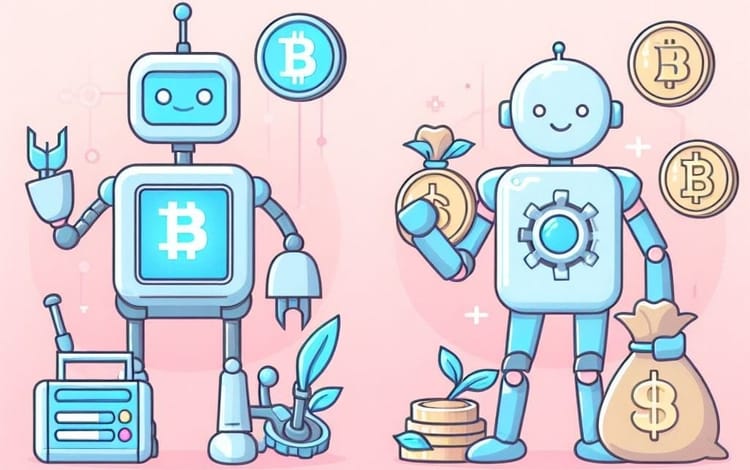

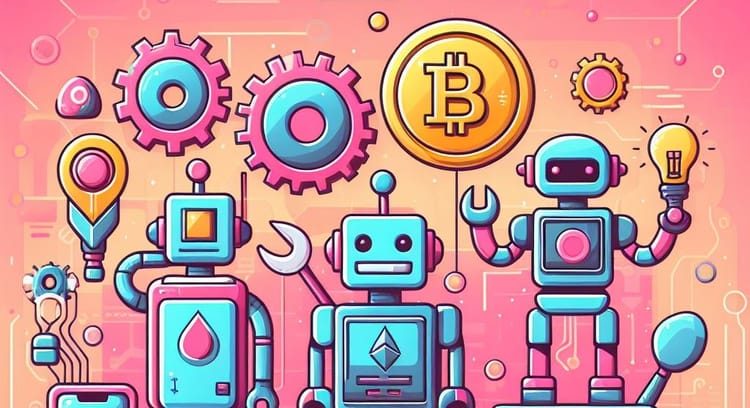

Member discussion